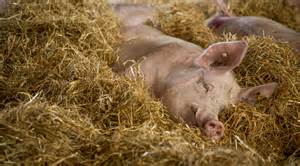



China joins the movement to end cruel confinement of pigs
Qinglian Food Company commits to improve the quality of life for a million pigs on farm. One of China’s leading food companies has partnered with international charity, World Animal Protection, to phase out the use of sow stalls on farms in China by 2025, giving pigs room to move, helping to reduce stress and improve health, and allowing the expression of natural behaviour.The announcement is following a global trend of companies, such as agricultural producers, Da Bei Nong in China and Thailand’s leading pig producer, Betagro, joining the movement to improve the lives of pigs by ending their cruel confinement in small crates, and giving them room to move in a comfortable environment.
China is the world’s largest pork producer, rearing around half of the world’s pigs every year – around 700 million animals. Growing pigs are kept in cramped, barren conditions, and sows are confined to narrow stalls for most of their lives, where they can’t even turn around and will never see daylight.
Steve McIvor, Chief Executive Officer of World Animal Protection, said: “This is a terrific opportunity to shape the future of the welfare of pigs in China. We congratulate Qinglian on this move and are keen to support and help them lead the way as they work to improve the welfare of pigs on their farms.”
Zhao Zhonghua, Country Director of World Animal Protection China, said: “As our economy develops, Chinese consumers are caring more about food safety and sustainable agriculture. We hope that more companies in China will help to improve the welfare of animals, so there are healthier and happier animals, safer food for consumers and a transformation to modern farming.”
Xu Mingshu, president of Zhejiang Qinglian Food Company Ltd, said: “For many years we have trialled traditional farming methods but now, under the guidance of World Animal Protection, we are pleased that allowing pigs to room to move and interact with other pigs will help our company become more sustainable in the long term.”
In China, consumers are increasingly demanding higher welfare products. A 2016 survey by World Animal Protection found two thirds of Chinese people would be willing to pay more for higher welfare pork, and 90% would be willing to change their purchasing habits, to move to pork products from pigs that have lived better lives.
World Animal Protection is now calling on companies across the world to join the global movement and improve the lives of pigs in farming.
As reported by World Animal Protection.










